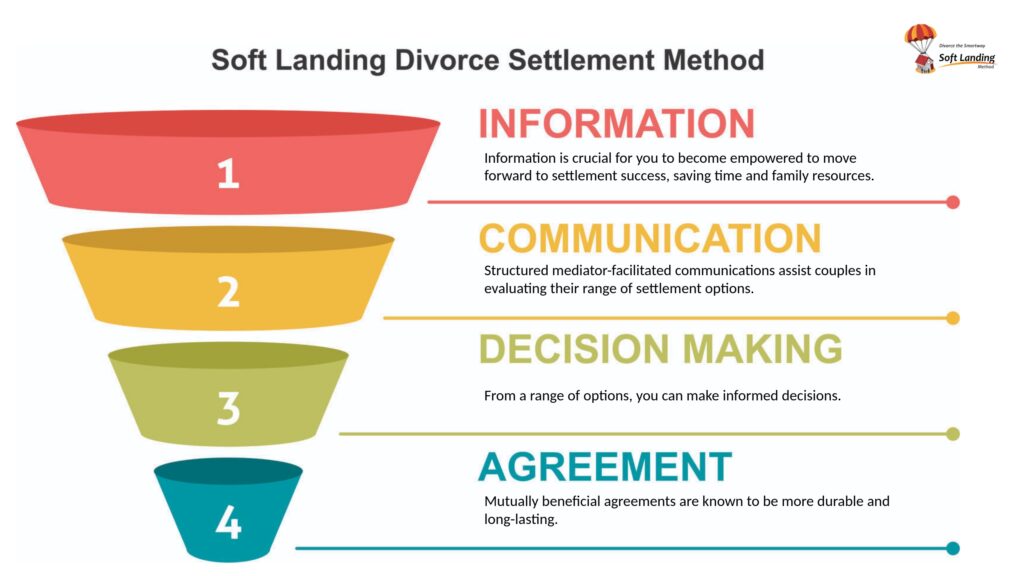Family Mediation: A Path to Peaceful Resolutions

Mediation FAQ
Family mediation typically costs between $150-500 per hour in Canada, making it significantly more affordable than court litigation
Family mediation offers a cost-effective alternative to traditional court proceedings, with several flexible payment options available. Most mediators structure their fees in one of these ways:
- Hourly rates: Usually ranging from $150-500 per hour depending on the mediator’s experience and location
- Flat-fee packages: Often covering a set number of sessions, typically between $1,200-3,000 for basic mediation
- Sliding scale fees: Income-based rates to make mediation more accessible for families with limited financial means
Many Canadian mediators also offer free initial consultations and can provide estimates based on your specific situation. Some legal insurance plans and employee assistance programs may cover a portion of mediation costs.
If mediation is unsuccessful, parties typically proceed to litigation while building on mediation progress
When mediation does not result in a settlement, parties maintain their legal right to pursue other dispute resolution options. The mediation process still offers valuable benefits, even without reaching full agreement:
- Parties gain clearer understanding of key issues and opposing viewpoints
- The scope of disagreement often narrows, making future negotiations more focused
- Information exchanged during mediation can streamline subsequent legal proceedings
- Participants can pursue traditional litigation or explore other alternative dispute resolution methods
Family mediation effectively resolves financial disputes through guided negotiation and mutual agreement
Family mediation is an excellent tool for resolving financial disagreements between separating couples. A qualified mediator helps parties navigate complex monetary issues while maintaining a cooperative environment.
Common financial matters addressed in mediation include:
- Property division – including homes, vehicles, investments, and personal belongings
- Spousal and child support – determining fair payment amounts and schedules
- Debt allocation – fairly distributing shared debts and financial obligations
- Pension and retirement savings – equitably splitting retirement accounts and benefits
- Business assets – addressing ownership and valuation of family businesses
The mediation process typically costs less than litigation while helping parties reach mutually beneficial agreements that protect both parties’ financial interests.
Family mediation agreements become legally binding when properly documented and formalized through legal channels
While mediation sessions themselves are not automatically legally binding, the agreements reached during family mediation can acquire legal force through proper documentation and validation. To make a mediation agreement legally enforceable, parties must take specific steps:
- Create a detailed written agreement documenting all terms reached during mediation
- Have independent lawyers review the agreement for each party
- File the agreement with the court as a consent order or incorporate it into a formal separation agreement
- Ensure both parties sign the final document in the presence of witnesses
Once these steps are completed, the mediated agreement carries the same legal weight as a court order and becomes enforceable by law. This provides both parties with legal protection while maintaining the collaborative nature of the mediation process.
Family mediation offers a faster, more affordable, and less stressful way to resolve disputes compared to litigation.
Choosing family mediation over court proceedings provides several significant advantages. Mediation empowers both parties to actively participate in decision-making and maintain control over the outcome, rather than leaving decisions to a judge. The process typically costs 60-70% less than going to court and can be completed in weeks rather than months or years.
- Preserves relationships – especially beneficial when co-parenting is involved
- Confidential process – unlike public court proceedings
- Flexible solutions – allows for creative, customized agreements
- Less stressful – promotes open dialogue in a supportive environment
- Better compliance – parties are more likely to follow through with mutually agreed-upon solutions
Family mediation typically takes 2-3 sessions over 4-8 weeks to complete
The duration of family mediation varies depending on several key factors, including the complexity of issues, willingness of parties to cooperate, and scheduling availability. Most cases follow a structured timeline:
- Initial consultation: 1-2 hours to assess needs and explain the process
- Mediation sessions: Usually 2-3 meetings, each lasting 1-2 hours
- Document preparation and review: 1-2 weeks between sessions
- Final agreement drafting: 1-2 weeks after last session
More complex situations involving multiple issues like child custody, property division, or financial settlements may require additional sessions. However, mediation typically resolves disputes faster and more cost-effectively than traditional court proceedings.
While not required, consulting a lawyer before finalizing mediation agreements is highly recommended
Family mediation can proceed without legal representation, but having a lawyer review your agreement helps protect your interests. A qualified family lawyer can provide valuable guidance by:
- Reviewing proposed agreements to ensure your legal rights are protected
- Explaining complex legal terminology and implications
- Identifying potential issues you may have overlooked
- Confirming the agreement is fair and enforceable under Canadian law
- Providing independent legal advice before you sign any documents
While the mediator remains neutral and cannot give legal advice to either party, consulting with your own lawyer before finalizing agreements adds an important layer of protection to the mediation process.
Family mediation begins with finding a certified mediator and getting both parties to agree to the process
Starting family mediation involves several key steps to ensure a productive dispute resolution process. A certified family mediator helps guide separating couples through important decisions about parenting, property, and support arrangements.
- Contact a qualified family mediator in your area and schedule an initial consultation
- Attend a mandatory mediation information session to learn about the process
- Ensure both parties provide written consent to participate in mediation
- Gather relevant financial and legal documents as requested
- Schedule your first joint mediation session once preliminary steps are complete
Most mediators offer a free initial consultation to discuss your situation and explain how the process works. The entire mediation journey typically takes 3-6 sessions, depending on the complexity of issues to resolve.
Family mediators specialize in creating collaborative child custody arrangements that prioritize children’s wellbeing
A family mediator serves as a neutral third party who helps separated or divorcing parents develop comprehensive parenting plans. These professionals facilitate constructive dialogue and guide parents through the process of establishing custody arrangements that work for everyone involved.
Through mediation, parents can address:
- Custody schedules including regular routines, holidays, and special occasions
- Decision-making responsibilities regarding education, healthcare, and activities
- Communication protocols between parents and with children
- Parenting guidelines to maintain consistency across households
- Conflict resolution strategies for future disagreements
Mediation typically costs less than court proceedings and helps maintain better co-parenting relationships, which benefits children’s emotional well-being long-term.
Family mediation is a structured process where a neutral mediator helps families resolve disputes through guided discussion and negotiation.
During family mediation sessions, a qualified mediator facilitates constructive dialogue between parties in a neutral, confidential environment. The process typically involves:
- An initial meeting to explain the process and establish ground rules
- Multiple sessions where both parties share their perspectives and concerns
- Guided negotiations to explore possible solutions and compromises
- Documentation of agreements reached during mediation
- Review and finalization of a legally binding settlement
The mediator remains impartial throughout the process, helping participants communicate effectively while ensuring all voices are heard. This collaborative approach often leads to more sustainable solutions than traditional court proceedings, saving both time and money while preserving family relationships.
A family mediator is a neutral professional who helps separating couples resolve disputes outside of court
A family mediator serves as an impartial third party specially trained in conflict resolution and family law matters. Their primary role is to facilitate productive discussions between separating or divorcing couples to reach mutually acceptable agreements.
These professionals help families navigate:
- Parenting arrangements including custody, access, and decision-making responsibilities
- Financial matters such as child and spousal support
- Property division including family homes, investments, and shared assets
- Communication challenges between separating partners
Unlike lawyers or judges, mediators don’t make decisions for families. Instead, they guide discussions, ensure both parties are heard, and help identify creative solutions that work for everyone involved. This approach typically saves time, money, and emotional stress compared to traditional court proceedings.
Mediation Benefits in Separation and Divorce




External links that may interest you:
- Ontario Association for Family Mediation – An Accredited Family Mediator (AccFM) helps you understand legal requirements and focus on your best interests for the best family outcome.
- Finding a certified family mediator – Only certified mediators can engage in family mediation, certified by Québec government-authorized professional orders.
- Family Mediation Canada | We Help Mediators Help Families – Family mediation is an informal, confidential, and voluntary way to resolve family disputes with the help of a neutral third party.
- Family mediation – Mediation is a negotiation with someone’s help to agree on separation or other family issues.
- Family Mediation – The mediator will talk to each person one-on-one to decide if mediation is right for your situation.
- Mediators – Province of British Columbia – Gov.bc.ca – A family law mediator assists families in resolving family law issues after separation through a formal dispute resolution process.
- Family mediation – The family mediation program offers couples with dependent children free sessions to resolve disputes.
- Family Mediation in Six Steps – A neutral third party called a “family mediator” helps you resolve issues through mediation.
- Family Mediation Process – Mediation helps parties resolve disputes and develop an agreement on resolving issues.
- Find A Mediator – Mediators may work with you virtually or travel. Search for mediators by city/town.
- Family Mediation | Early Family Dispute Resolution – A family mediator helps parties work through and resolve family issues.
- Choosing your family mediator – JuridiQC – Ask about the mediator’s fees and participation in the subsidized family mediation program.
- The Role of the Family Mediator – A family mediator helps ex-partners reach an agreement on family matters during separation.
- Become an accredited family mediator – Complete 10 family mediation mandates under the supervision of a certified mediator within 2 years of certification.
- TORONTO FAMILY MEDIATOR – Home – Offers experienced, understanding, affordable, and confidential mediation and counseling services in Toronto & York Region.
- Family Mediator | Justice Institute of British Columbia – Family mediators must be qualified dispute resolution professionals and meet minimum training and practice requirements.
- Mediators | Family Law in BC – Private mediators charge for their services, but mediation is generally less expensive than court.
- Family dispute resolution: resolving family law issues out – A mediator helps you and your former partner identify and discuss issues related to parenting, separation, or divorce.
- Family mediation service providers – A family mediator helps individuals going through a separation or divorce resolve their disagreements.
- Certificate in Family Mediation | Toronto, Canada – An experiential application of skills learned throughout the Family Mediation Certificate program.
Ken Maynard CDFA, Acc.FM
I assist intelligent and successful couples in navigating the Divorce Industrial Complex by crafting rapid, custom separation agreements that pave the way for a smooth transition towards a secure future. This efficient process is achieved in about four meetings, effectively sidestepping the excessive conflicts, confusion, and costs commonly linked to legal proceedings. Clients have the flexibility to collaborate with me either via video conference or in-person through a DTSW associate at any of our six Greater Toronto mediation centers, located in Aurora, Barrie, North York, Vaughan, Mississauga, and Scarborough.















































